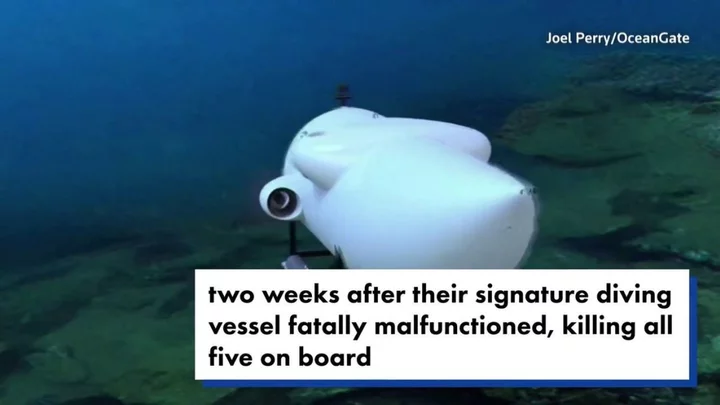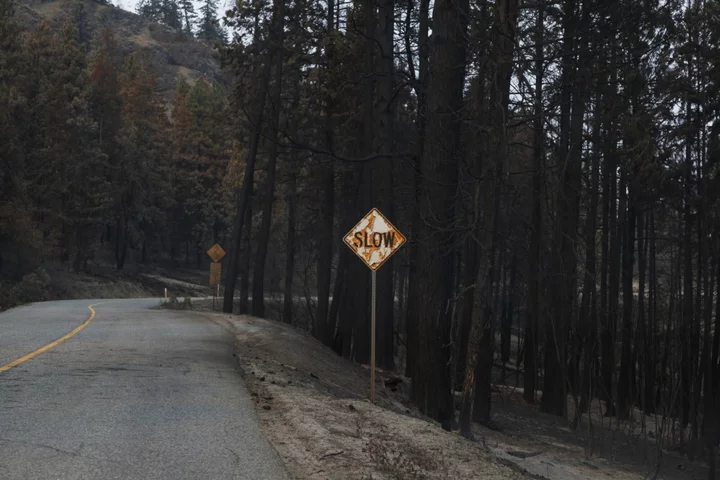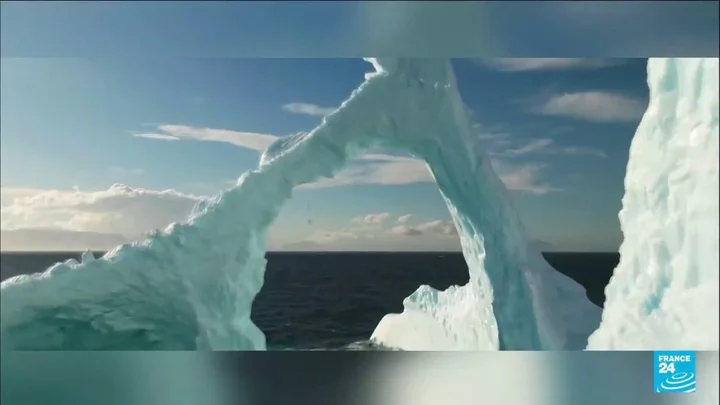
Spotify to Cut Back Promotional Spending on White Noise Podcasts
Spotify Technology SA is cracking down on white-noise podcasters, reducing the advertising support for programmers that provide little
2023-09-02 00:50

Meta Rejects Trudeau’s Olive Branch in Canada Online News Feud
Prime Minister Justin Trudeau’s government released new details of a law that tries to force technology companies to
2023-09-02 00:50

Canada tries to address news law concerns, Facebook not convinced
By Ismail Shakil and David Ljunggren OTTAWA Canada unveiled draft rules on Friday for a law to compel
2023-09-02 00:45

Biden boosts spending request to help pay for disasters
By Jarrett Renshaw The Biden administration on Friday added $4 billion to a supplemental funding request to Congress
2023-09-02 00:28

Africa Offers Global Warming Solution in 1st Climate Declaration
Africa will seek to present itself as a solution to the global warming crisis in a declaration to
2023-09-02 00:27

A new Titanic expedition is being planned – and the US government wants to stop it
You would think people would read the room, and learn from the tragic and fatal implosion of the Oceangate submersible in July, yet there’s already plans for another trip down to the Titanic wreckage next year – and the US government doesn’t want it to go ahead. Two months after the Titan sub crushed underwater, killing five people, officials are trying to stop Georgia-based firm RMS Titanic Inc. (RMST) from trying to recover further historical items from the wreckage to add to its collection of artifacts it exhibits. While RMST owns the salvage rights to the doomed liner which infamously struck an iceberg and sank in 1912, the US government is drawing attention to both federal law and an international agreement which classes the shipwreck as a hallowed gravesite. According to the Associated Press, the government states in court documents filed on Friday that RMST is “not free to disregard” the “validly enacted federal law” mentioned above, but it nonetheless is “its stated intent”. “[The shipwreck] will be deprived of the protections Congress granted it,” its lawyers argue. RMST, meanwhile, says it looks to take images of the entire site, including areas where “deterioration has opened chasms sufficient to permit a remotely operated vehicle to penetrate the hull without interfering with the current structure”. Provided the objects are not “affixed to the wreck itself”, artefacts recovered could include items from “inside the Marconi room” – that’s the room where the ship’s wireless radio was used to communicate with other vessels and those on the shore. RMST also insists they do not plan to cut into or detach any part of the wreck “at this time”, but that they don’t plan to seek a permit from the National Oceanic and Atmospheric Administration (NOAA) – something the US government says it needs in order for the firm to move forward with its plans. The NOAA oversees the public interest in the Titanic, and on its website accepts it “may be in the public’s interest to salvage some artifacts” from the wreckage. “NOAA therefore balances this value with the Congressional intent to manage the wreck site as a maritime memorial consistent with the International Agreement, which proclaims that the Titanic shall be recognized as a memorial to those who perished. “NOAA has concluded that the recovery of many of the artifacts from the debris field (with certain exceptions) is consistent with the NOAA Guidelines and the International Agreement, including the in situ preservation policy. “However, NOAA has also determined that recovery of artifacts from within either of the two hull sections is not consistent with the purposes of a maritime memorial.” It’s not the first time the US government and RMST have had a legal battle over the ship, as back in 2020 a similar case concerning a planned expedition made its way to the courts, before the coronavirus pandemic scuppered proposals and the issue didn’t go any further. Sign up to our free Indy100 weekly newsletter Have your say in our news democracy. Click the upvote icon at the top of the page to help raise this article through the indy100 rankings.
2023-09-02 00:26

Record-Breaking Wildfires Drag Economic Growth Lower in Canada
Canada’s worst wildfire season on record, along with growing droughts in many parts of the country, have taken
2023-09-02 00:20

Stanford, Cal and SMU to join Atlantic Coast Conference
The Atlantic Coast Conference (ACC) is expanding to 18 schools with the addition of Stanford, Southern Methodist University (SMU) and the University of California-Berkeley, after a vote by the conference's board of directors on Friday.
2023-09-01 23:48

Upstart’s Abrupt Stock Drop Shows Perils of AI Hype
A rapid reversal in the shares of online-lending firm Upstart Holdings Inc. underscores the dangers for stocks swept
2023-09-01 22:52

UK Faces Heat Wave Risk as Cool Summer Gives Way to Balmy Autumn
A potential heat wave threatens the south and east of the UK next week, just as the meteorological
2023-09-01 22:23

Ford expects to take about $270 million charge related to SUV, van recall
Ford Motor said on Friday it expects to take about $270 million charge for a previously announced recall
2023-09-01 21:57

Scientists have discovered a new 'Antarctica' accent
Antarctica might be the only continent on Earth with no natural human habitation, but it’s emerged that an “Antarctica accent” is very much a thing. Despite having no locals, thousands of scientists have made up an ever-changing population in research stations over the years. The continent is so isolated and the level of interaction between researchers is so intense, that a common accent is beginning to emerge there despite people coming from different parts of the world. At its busiest points in the year during the summer, Antarctica is home to around 5,000 people. Only around 1,000 people live there during the winter months. The idea of accents changing due to human interaction on Antarctica is no different to the phenomenon seen throughout history at a glacial pace. However, given the very specific sample size, it’s an opportunity for scientists to study it at a much quicker rate and on a much smaller scale. Experts at the Ludwig Maximilian University of Munich published a study in 2019 which focused on the change in accents observed in 11 people who took part in the British Antarctic Survey. @human.1011 There’s an Antarctic Accent! #language #linguistics #english #antarctica Of the 11 who were studied, eight came from England, one from the US, one from Germany and one from Iceland. Their voices were recorded every six weeks, and the team found that over time they developed longer vowel sounds. There was a physical change too, with participants pronouncing the “ou” sound in the front of their mouths rather than the back of their throats. Speaking to IFL Science, Jonathan Harrington, study author and Professor of Phonetics and Speech Processing at the Ludwig-Maximilians University of Munich said: "The Antarctic accent is not really perceptible as such – it would take much longer for it to become so – but it is acoustically measurable. "It's mostly an amalgamation of some aspects of the spoken accents of the winterers before they went to Antarctica, together with an innovation. It's far more embryonic [than conventional English accents] given that it had only a short time to develop and also, of course, because it's only distributed across a small group of speakers.” Sign up for our free Indy100 weekly newsletter Have your say in our news democracy. Click the upvote icon at the top of the page to help raise this article through the indy100 rankings.
2023-09-01 20:59
